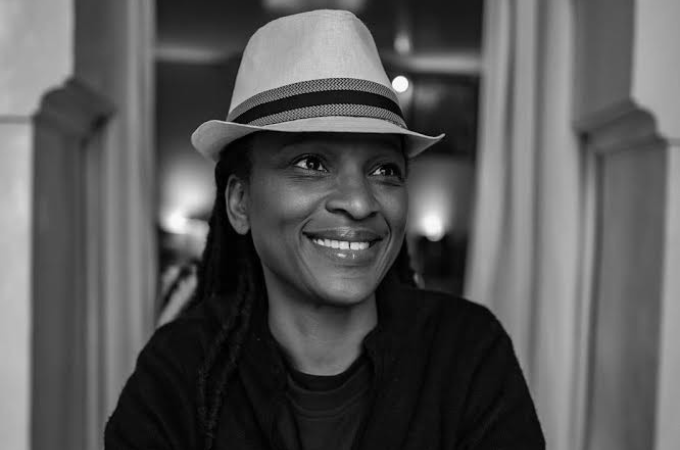
We had the incredible opportunity to talk to eminent Nigerian author Chika Unigwe about her 2023 novel The Middle Daughter. She shared with us the inspiration behind this novel, the challenges of writing a character experiencing domestic violence, and the importance of retelling women’s experiences through writing.
The Middle Daughter is a powerful story that reimagines the myth of Hades and Persephone through the story of a middle daughter in an Igbo family. When seventeen-year-old Nani loses her older sister and her father, her world turns upside down. Isolated and misunderstood by her grieving mother and sister, she’s drawn to a handsome preacher who offers her a place to belong. But his promises come at the cost of violence. Nani finds herself tethered to her abusive husband because of her children, but she must find the courage to break free.
Chika Unigwe is an award-winning Nigerian author writing in English and Dutch. She has been writing for over two decades and has published critically acclaimed fiction such as On Black Sister Street (2008), Night Dancer (2012), Black Messiah (2014), and Better Never Than Late (2019).
***
Brittle Paper
Hello Chika, how are you doing? How is life treating you? Congrats on the new book.
Chika Unigwe
I am doing very well, life’s good, thank you very much. How are you doing?
I’m doing well, thank you! You have published many books, at this point. Was there anything memorable about the process of drafting The Middle Daughter?
Chika Unigwe
The fact that it never gets easier. The fact that I am still an incredibly anxious writer lacking in confidence. The fact that I could do it at all.
The Middle Daughter is the story of a woman stuck in a loveless and abusive relationship. What inspired it?
Chika Unigwe
The Middle Daughter is a feminist, contemporary retelling of Hades and Persephone. Nani, a teenager, is lured into a marriage by Ephraim, but she never accepts the relationship as valid, as Persephone never should have. Not even for six months of the year. I don’t like that there are versions of Hades and Persephone where Persephone is implicated in her own abduction. And versions where she falls in love with Hades. I don’t like Hades getting away with taking a wife who doesn’t choose him. I wanted to correct all of that, so The Middle Daughter has a happy ending for Nani. Perhaps, it’s not a book about a woman stuck in a loveless and abusive relationship, but one about a woman who successfully fights to free herself from a loveless and abusive non-relationship. It was also inspired by a story I heard from a friend of mine whose classmate had a similar experience as Nani, and I wanted the woman to have a happy ending too, and for her husband to be punished.
Brittle Paper
The novel gets dark in terms of Nani’s experience of domestic violence. How did you approach wrestling with such a difficult issue in your writing?
Chika Unigwe
I always knew it was going to have a happy ending which was the entire purpose of writing it. I wanted a Hades and Persephone retelling where Persephone is freed forever from Hades. Knowing that Nani ends up triumphant made it easier for me to look into Ephraim’s soul and excavate the most inventive abuse he could for Nani. It wasn’t easy to write because men like Ephraim exist (and I have known women married to men like him), but knowing he would get his comeuppance gave me the courage to stare into that deep blackness.
Brittle Paper
Speaking of the theme of abduction that connects Nani’s and Persephone’s stories, I can’t help but think of the Chibok girls and the specific kind of patriarchal violence that sees women’s bodies as available for “taking.” But, I like your idea of an alternate reality in which women who are taken all escape and go back to a new life. I love your suggestion that what mythology or real life refuses us, we call into being through fiction. As a writer, how do you see the relationship between life and fiction?
Chika Unigwe
Thank you. Some say fiction is a reflection of life. But it is more than that. It is also a reflection of what can be. Unlike life, it is easy to perform magic in fiction. You can right life’s wrongs in fiction. All of the Chibok girls, sadly, don’t have a happy ending, but fiction around it could give them that. That’s not to say that we come to fiction to escape life. I don’t think that it is desirable because how do we change things if we are unable to look at them properly? To confront them? We come to fiction to see life as is, as it can be, and to be reminded of all the other possibilities that there are.
Brittle Paper
There are readers who criticize stories that depict African or Black women suffering, claiming that we need more stories about black female joy as opposed to their brokenness. How would you say The Middle Daughter complicates such an outlook?
Chika Unigwe
I am not a strategic writer. I never start out thinking of what readers may say. Stories come to me and I write them. I don’t think about how it fits into or departs from what anyone thinks “Black writers should be writing.” We can write all the Black joy we want, it doesn’t mean that Black suffering is gone. We can’t banish suffering by ignoring its existence. There is room in the world for all of our stories. I will never prescribe to a reader what to read, and I don’t think readers should be prescribing to writers what to write. However, The Middle Daughter is not just about Nani’s brokenness (and that brokenness is never gratuitous), its presence is very much about her joy. It’s a celebration of her victory and her resilience.
Brittle Paper
Were there particular things you considered in making creative/aesthetic choices on how to represent Nani’s abuse?
Chika Unigwe
I don’t agree that we should shirk from articulating/transcribing/writing about terrible things but I do think that we have a duty to do so in a way that neither glorifies nor trivializes them. I was very careful not to write abuse-porn, so things are suggested rather than spelt out. I wanted readers to be there with Nani, to feel her fear, her powerlessness, her sadness, her anger, her claustrophobia. I wanted it to be visceral and every scene I chose, every word I wrote, was in service of that.
Brittle Paper
The idea of the family has always been the lifeblood of the novel as a form of storytelling. From Charles Dickens to Ben Okri, characters pine for the experience of belonging in families. What do you think Nani’s experience brings to the idea of family as space both of trauma and the possibility of laughter?
Chika Unigwe
Characters are humans we create, and like the wise say, “No man is an island.” I suppose Nani’s experience highlights how even when the family is loving, that space can still be oppressive because of reasons older/bigger than any individual member of that family. Nani has a loving family, but that love is a puny force against patriarchy, for example. Nani’s dread/inability in telling her mother about Ephraim, Ephraim’s confidence in the “rightness” of his actions, Nani’s mother’s way of mothering: all of these are rooted in a society that has prescribed ways for women to be, for girls to be, for men to be and so on. Nani never doubts her mother’s love (I don’t know that she even thinks of her mother in terms of loving or not loving her), but she is categorical in her belief of how her mother will react to her spending the night in a man’s room, for example, and that belief isn’t unfounded. If the family is a microcosm of society, then Nani’s family shows how our contemporary Nigerian society and culture is both a space of trauma and of joy.
Brittle Paper
One of my favorite moments is when Nani reunites with a close relative and they spend a couple of days talking and eating. Can you reflect a bit on the importance of seemingly small things like talking and sharing communion with others as a path to healing?
Chika Unigwe
In many Nigerian homes, food is a powerful love language. As a child, whenever I got sick, I was lured back to health by my mother begging me to eat all of my favorite dishes. When I was away at university, I loved on myself the same way . My first year in Belgium, I was ill with malaria and couldn’t eat. No one around me, not my husband or my parents-in-law with whom we lived thought I should eat if I had no appetite. I, irrationally, felt so unloved at that moment. I might have even cried. Recently, every Sunday, I drive down to visit my mother. The first thing she asks is if I’ve eaten. When she was stronger, any time I visited her, she’d drive me to her local grocery store and make me choose the ingredients for whatever I wanted her to cook for me. There is a reason Ndi Igbo say that he who brings kola nut brings life, and why every serious occasion begins with the breaking (and sharing of kola nut). The belief that food nourishes the body and the soul is a deeply rooted one. One doesn’t eat with one’s enemies. In fact, as a child, you learned not to accept food from strangers (potential enemies). I was told that in the past, children would go to parties and be served a big pan of rice, and everyone just dug in; husbands and wives ate out of the same plate and so on. So in my culture (and perhaps in other African cultures), eating is a communal event. People may not all be sitting down together at the table, at the same time, but if anyone walked in while you were eating, you asked them to join you.
It makes sense that when Nani gets to Enuka’s house, a lot of their talking will take place while they are eating. Enuka understands that Nani needs the nourishment of both her body and soul to heal, and talking helps with the process. What is not spoken sours in the stomach. In Igbo culture, meetings are vital to the success of communities. At these regular meetings, grievances are settled, friendships are rekindled, advice is given, and so on. When I hear people say that Nigerians don’t do therapy, I want to point them to Igbo communities. We invented (group) therapy, Family meeting is called for everything so that things are talked out. Talking and sharing communion are not small things. They are vital to healing in my culture.
Brittle Paper
Sisterhood is a major theme in the story. At several points in the story, I thought about my own sisters and the dynamics that shaped our relationship. Is there any part of your own experience that shaped your representation of sisterhood in the story?
Chika Unigwe
I am one of five sisters and we are really close. We are friends, we call each other up, visit each other and genuinely enjoy each other’s company. We all live in the same city and would sometimes spend nights in each other’s homes. I wanted something like that for Nani: a sister who would fight for her without needing to know the entire story.
Brittle Paper
You’ve been writing for 20+ years and you have centered a lot of your writing on women’s experiences. What would you say has stood out to you in these many years that you have chronicled women’s experiences and crafted women’s characters? Have you learned anything in particular from years of giving flesh to women in stories?
Chika Unigwe
The biggest lesson I’ve learned is this: the more things change, the more they stay the same. Sounds pessimistic but it is difficult not to be. Recently on Nigerian Twitter, a tweet about a man who killed a woman he “trained in school” went viral. He had paid her school fees in exchange for marriage, but the young woman graduated and refused to marry him and he murdered her. There were young people in the thread who sided with the murderer (even if not with the killing, but with the idea that he owned her). I seem to be haunted by different versions of the same story, and so the challenge is finding ways in which the women in my narratives can fight back because I do want them to have that choice. Writing, for me, isn’t just about reflecting society, how things are. It is also about imagining new possibilities, how things could be.
Brittle Paper
You are the queen of the tease. Statements like “at the moment we didn’t know the worst was yet to come” keep the reader wanting to know more. I love these subtle cliffhangers! What elements of style and form did you enjoy incorporating to shape the reader’s experience of Nani’s world?
Chika Unigwe
I love watching TV series’ because every episode ends on a cliffhanger. They help build anticipation and tension. I also thoroughly enjoyed the challenge of creating distinct voices for each character, particularly Ephraim.
Brittle Paper
Pardon me but, like Nigerians like to say, I’m about to ask you an exam question. There is this fascinating element of the story: Udodi’s Chorus. It’s the first thing you see when the story begins but you quickly realize that Udodi is also Nani’s sister who dies right at the start of the novel. What is this fascinating element of the story’s form? Why did you choose to incorporate it?
Chika Unigwe
LOL. Exam questions are great! In Igbo culture, when people die, they become ancestors (and live underground rather than above which is why we pour libation to the dead, etc.) and remain an important part of the living world. In classical Greek plays, the chorus is also very much part of the world of the plays. Udodi is there to pay homage to the Greek tradition but also to infuse this contemporary retelling with Igbo tradition. It’s fascinating seeing how different cultures talk to each other and connect with each other. As a secondary school student, a traveling university troupe staged Ola Rotimi’s The Gods are Not to Blame at our school. I was stunned to discover that this very Yoruba play was adapted from an ancient Greek play. I love when narratives from different eras/cultures/peoples transcend all these barriers to find relevance and home in our own time. Not just Udodi’s chorus, but the book in its entirety is my contribution to retellings of classic myths.
Brittle Paper
Villainy is an interesting aspect of storytelling, and in the current climate where identity has become so politicized, do you think it matters that Ephraim is a French Cameroonian as opposed to, say, a Nigerian man?
Chika Unigwe
I wanted a character whose inability to produce other family or friends or even history wouldn’t be problematic for Nani. I also wanted someone whose colorful verbosity would have its roots in a language that is naturally descriptive (and colorful). If Ephraim had been Nigerian, Nani would have found him suspicious from the get-go.There would have arisen all sorts of questions over where he went to school, why he doesn’t have ‘old’ friends and so on. It’s natural that we tend to think of foreigners as people without a past. And anyone who moves somewhere new also gets a chance to reinvent themselves. However, I also wanted him to come from a country close enough to Nigeria that other problematic questions wouldn’t arise. French Cameroon seemed like the perfect nationality for him.
Brittle Paper
Chika, thank you so much for taking the time to respond to these questions and gifting us such a brilliant book.
Chika Unigwe
Thank you very much, I appreciate your support.
***


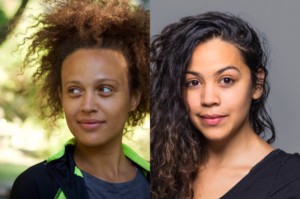
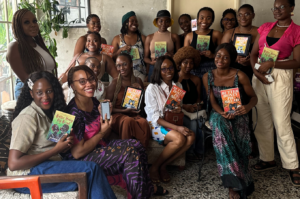
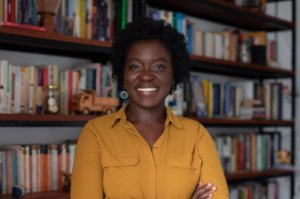
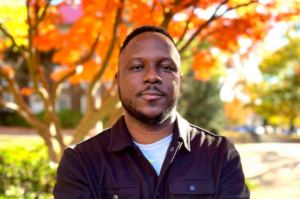

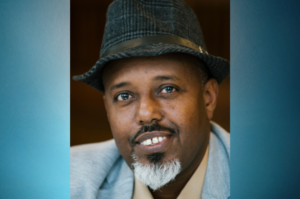

COMMENTS -
Reader Interactions